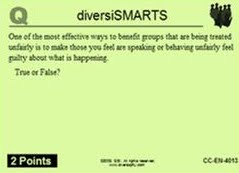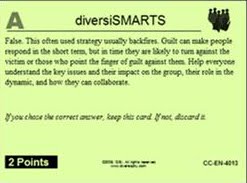We grow up learning at play the skills we need for life, both alone and with other children. Then at a certain point we “grow up” and “stop playing games.” Both phrases not only seem to describe the passage to adulthood, but become psychologically negative admonitions in our mouths. “Grow up!” means, “Be serious, stop your childish ways of demanding things and attention,” while, “Stop playing games” suggests a condemnation of everything from harboring hidden agendas to outright dishonest, manipulative behavior. We play a lame shame game to protect name and fame from accusations of frivolity.
Some years ago, in the midst of intense urban ethnic conflict, a colleague of mine was conducting Star Power, a large scale simulation game. It aimed at raising awareness of the dynamics of racial crisis and bringing about the kind of dialogue that might lead to a better resolution than calling in the military to restore order. At the height of the simulated conflict, one of the participants ran up to my facilitating friend and started to choke him. With remaining breath he squeaked out, “Game’s over!” at which point the aggrieved assailant relaxed his grip and the rage drained away.
Good games simulate reality. Reality is messy, chancy, full of the unexpected, often tense and stressful, forcing us to change our act if we are going to succeed. In other words, reality is a game without a safety valve. There is no one to shout, “Game’s over!” That’s why the virtual reality of games can help us safely explore many things in living and working with cultural diversity that in real time would prove hard to fathom, let alone resolve.
Games set up an alternative reality by presenting a set of rules of play. We leave the real world to enter the make-believe world where we are less constrained by the consequences of our behavior and our choices, and we can learn from them as well as freely reflect on how we performed. The power and the joy of learning through games derive from the presence of four elements of play that occur naturally in almost all cultures. [1]
• ![]() the classical Greek root of our word “agony”—how we feel when giving our best effort, struggling against the odds, entering the “home stretch,” or "hitting the wall."
the classical Greek root of our word “agony”—how we feel when giving our best effort, struggling against the odds, entering the “home stretch,” or "hitting the wall."
• ALEA the sense of unpredictability, chance, not knowing what will happen next—"the luck of the draw," “the roll of the dice.” (Alea was the Roman word for a game of dice.)
• VERTIGO disorienting the mind & senses, "topsy-turvy," losing the normal frame of reference, our customary bearings.
• ![]() miming, imitation, entering another's reality, playing a new role, "walking a mile in someone else's shoes."
miming, imitation, entering another's reality, playing a new role, "walking a mile in someone else's shoes."
The stimulation and learnings of a game, strong in these elements, is rarely forgotten. So it is the task of the intercultural gamewright to build then into the experiences offered to learners and sojourners. The authors have tried to build them into one of the simplest of games, partly a quiz, a set of cards containing questions, situations, risks and discourse as they come to a person in a new cultural environment, with little warning or predictability, but from every direction.
Hence, diversophy® a collection of factoids, critical choices, risks, wisdom and reflective questions played by anywhere from three to eight people around a table taking turns, rolling the dice, picking up a card and facing the challenge, as in life, to whatever has come their way.
The card categories are named to fit the challenge: diversiSMARTS cards test one’s factual knowledge about a culture, diversiCHOICE ask us to pick a course of appropriate behavior in our new cultural setting, while diversiRISK cards subject us to surprise happenings in an unfamiliar context, some positive surprises, and others disappointing results from our behavior or mere presence in alien surroundings. diversiGUIDE cards give us wisdom from the new culture itself and those who have fathomed it well, while diversiSHARE cards ask us to compare the new culture’s values and approaches to everyday human situations with what we were raised to believe or do.








Sample cards are taken from Cultural Competence diversophy®
Bridging difference with head, heart, hands & relationships
Being thrust into a new culture without some orientation to its differing haphazardness can feel like being hit in the face with a wet diaper. Developing diversophy® (wisdom about differences) in a playful way can save us some stink and mess as we try to cope with work and life away from home.
There are many intercultural simulations and games that beckon us from the familiar to familiarization. diversophy® is but one. As Shunryu Suzuki-Roshi remarked, "In the beginner's mind there are many possibilities, but in the expert's there are few." [2] Why cite a Zen master in a playground? Simply because leaving real time and entering playtime is one of the easiest paths to enlightenment about reality. Play and simulation allow us to enter the dance of a culture as an unfolding drama rather than letting it enfold us as brutish karma. It should not surprise us that theater originated in religious contexts and that play remains a sacred space we can enter together.
Aw, com’on, roll the dice and let’s play!
[1] These four game elements were first identified by the French psychological anthropologist Roger Caillois (1913-1978), in Les Jeux et les Hommes: le masque et le vertige (Gaillmard, 1967). They were recently described in detail in Mihaly Csikszentmihalyi's Flow: The Psychology of Optimal Experience. (Harper, 1990).
[2] Zen Mind, Beginner's Mind, 1973
Dr. George F. Simons
George Simons is an independent consultant who delivers intercultural programs, particularly Influence and negotiation skills with a focus on leadership, performance improvement and global teamwork.
He is the creator and/or editor of over fifty games in the diversophy® series of training room and online cultural training instruments and has authored eight instruments in the Cultural Detective® series.
Katrin Volt, MA
Katrin Volt has trained learners from diverse backgrounds and nationalities in the UK, Spain, and her native Estonia. Currently a consultant at George Simons International, she manages the development of new intercultural learning games and edits them for publication. She coaches interculturalists who wish to learn how to use new technology and conduct online education in immersive spaces.
All information contained herein provided by diversophy®
